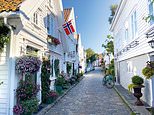
If two weeks on a sunlounger, pinballing between the cocktail bar and the pool, were once the go-to summer getaway for British holidaymakers, it seems times – and tastes, have changed.
The latest list of new entries into Collins Dictionary, whose lexicographers keep a careful eye on the words used in modern parlance, includes the word ‘coolcation’.
The term, believed to have been coined in the US, involves choosing a cooler destination to holiday in, swapping out traditional beach destinations for more northerly cities or nature-based adventures.
The holiday type has become increasingly popular as tourists strive to avoid the blistering heats – often up to 40 degrees – that are now common during June, July and August across southern Europe.
Destinations where temperatures rarely hover above 25 degrees in the summer, such as Norway, Denmark and Finland, have become popular ‘coolcation’ spots – with Iceland, Scotland, Greenland and Canada enjoying more visitors.
Earlier this year, Scandinavian carrier SAS said bookings from Spain, Italy and France to the Norwegian city of Stavanger had soared by 38 per cent ahead of the summer season – as southern Europeans escape the rising mercury.
Thomas Thessen, chief analyst at SAS, told Norwegian newspaper VG, that colder weather had traditionally gone against Scandinavian destinations trying to woo in tourists, but it was now increasingly viewed as an asset.
‘For many, Scandinavia’s cool climate is no longer a disadvantage. In fact, it’s become a key reason to book a trip.”
Point that compass north: Coolcation has entered the Collins Dictionary this week, reflecting changing travel habits (Pictured: Stavanger Old Town in Norway)
Earlier this month, Skyscanner launched its annual ‘2026 Travel Trends Report’, which identified emerging behaviours and destinations set to define travel for next year.
The flight search engine surveyed 22,000 global travellers about their plans and curated the travel words that are becoming more common.
These include ‘glowmads’, a beauty trend in which travellers take part in in-flight beauty routines and shop for local beauty products.
‘Altitude shift’ is another to make the list, with travellers booking mountain breaks not just for skiing but for cooler weather as well as serenity.
TRAVEL-RELATED WORDS – DO YOU KNOW WHAT THEY MEAN?
Coolcation: Choosing to holiday in a cooler destination
Rawdogging: Enduring a flight with no food, drink or entertainment
Glowmad: An in-flight beauty routine or shopping for local beauty products
Altitude shift: Heading to the mountains, not just for skiing
Babymoon: A final romantic break as a two before becoming a three
Shelf discovery: Shopping for local food
Other travel words to be aware of? ‘Rawdogging’ has been trending on TikTok all year; the phrase referring to the brutal pastime of enduring a flight – often long haul with no food, drink or entertainment.
Across the board, the latest entries into the Collins Dictionary spanned a wide range of subjects, with an IT phrase scooping the title of ‘word of the year’.
Chosen by lexicographers from a pool of new terms, ‘vibe-coding’ has been selected as this year’s winning word.
It is defined as an easy way for non-IT minded individuals to make computer code simply by telling artificial intelligence (AI) programs to do it.
The team used its Collins Corpus database, which tracks language across social media and TV, to select the phrase coined by Andrej Karpathy – a former AI boss at Tesla and founding engineer at OpenAI.
Other words on the list include ‘biohacking’, defined as the activity of altering the natural processes of one’s body in an attempt to improve health and longevity.
Another is ‘clanker’, a derogatory term for computers, robots, or sources of AI, which was popularised by Star Wars: The Clone Wars.
Scandi airline SAS reported a surge in summer travel to Stavanger, pictured, in Norway this summer, with bookings up by 38 per cent on travellers from Spain, Italy and France
The word went viral on social media and is often used to express people’s frustrations with, and distrust of, AI chatbots and platforms.
Alex Beecroft, managing director of Collins, said: ‘The selection of vibe coding as Collins’ Word of the Year perfectly captures how language is evolving alongside technology.
‘It signals a major shift in software development, where AI is making coding more accessible.
‘The seamless integration of human creativity and machine intelligence demonstrates how natural language is fundamentally changing our interaction with computers.’
Source link
CHECK OUT: Top Travel Destinations
READ MORE: Travel News



